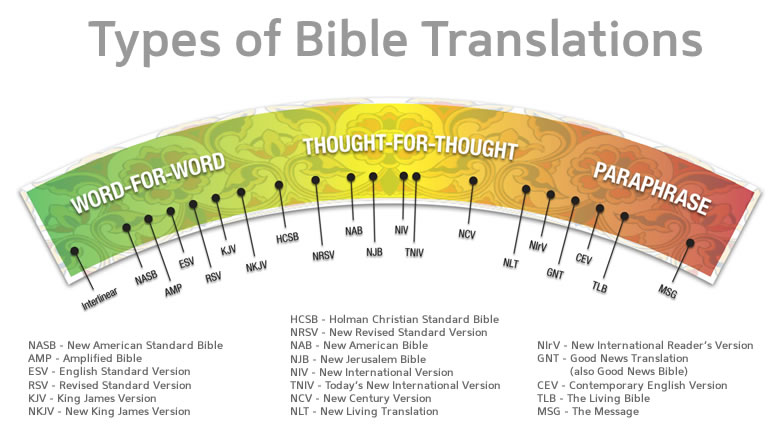Translations of the Bible
“Wait, no, Mr. Kevin, you’re not serious…are you?”
Kevin was holding Bible study for a few of his high school boys and I could hear snip-its through the wall. I heard Kevin’s footsteps down the hall and he poked his head into the room I was hiding in.
“Renae, can I borrow your nerdy people Bible? They think the Bible was first written in English.”
I went to the bookshelf and pulled out one of my most prized possessions, my Hebrew/Greek Bible.
Kevin returned to the living room and the boys burst into commotion – “There’s no way THAT’S a language.”
I chuckled. That’s exactly how I felt the first day of Hebrew class.
 Fast forward one week: I attended a city wide women’s Bible night with two ladies from my office. The speaker used The Message to make her points on Matthew’s recitation of “Come Ye Who are Weary.” One of her points raised my theological flag – I wasn’t certain if the meaning came from Eugene Peterson’s interpretation or if it came from the original language – that chicken scratch called Greek. So I pulled out my phone and opened my Greek app to fact check her.
Fast forward one week: I attended a city wide women’s Bible night with two ladies from my office. The speaker used The Message to make her points on Matthew’s recitation of “Come Ye Who are Weary.” One of her points raised my theological flag – I wasn’t certain if the meaning came from Eugene Peterson’s interpretation or if it came from the original language – that chicken scratch called Greek. So I pulled out my phone and opened my Greek app to fact check her.
The next day, one of the ladies asked me what The Message was. I told her it was a loose translation of the Bible created by a man named Eugene Peterson. We have used it on occasion with the youth group but that I don’t recommend it for person study. In 60 seconds, I explained what the above picture shows: that as a translator you have to decide where on this scale you want your version to fit. (Note: I’m not certain how accurate this depiction is…but it seems close enough for us to all understand the point.)
These were the statements made to me:
- I only read the “paraphrase” Bibles because I believe that Christianity is a religion of the heart. We don’t need to get bogged down in word studies
- I don’t know why you needed to fact check the speaker. I just absorb what speaks to me and leave behind what doesn’t.
- You like the facts. I like the feelings. What’s right for you may not be right for me. And that’s fine.
After pondering this conversation all weekend, these are the three places in Scripture the Lord brought to my attention:
1. Acts 17:11 – The people here [Berea] were more open-minded than those in Thessalonica, since they welcomed the message with eagerness and examined the Scripture daily to see if these things were so.
2. Matthew 22:37 – [Jesus] said to [the expert in the law], “Love the Lord your God with all your heart, with all your soul, and with all your mind.”
3. Deuteronomy 6:5 – Love the Lord your God with all your heart, with all your soul, and with all your strength.
I struggle with an intellectual religion – that is – it is easy for me to accumulate facts and data from the Scripture and never transfer them into application. This is wrong.
But we must not forget that Christianity is not a feeling or a whim. It is a life-altering journey during which Christ demands all of us – our hearts, our souls, our minds, even our strength. The Bereans are not depicted as arrogant or smug. Rather, they were eager to receive the word. But they were also cautious. They understood that the Scripture contains words of life – and they weren’t willing to accept anyone’s interpretation – not even the Apostle Paul’s – without first making certain it aligned with Scripture. We should be the same today.

No comments yet.
Add your comment